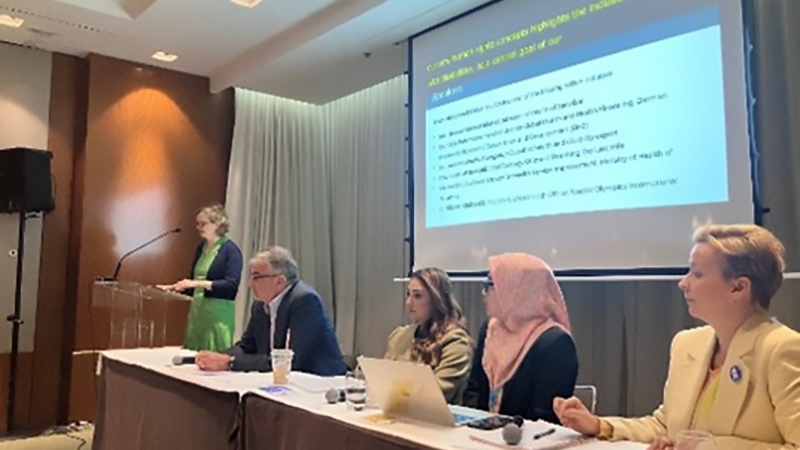Every year, representatives of global health ministries gather in Geneva, Switzerland, for the World Health Assembly (WHA), the decision-making body of the World Health Organization (WHO). In addition to the official WHA proceedings, held at the prestigious Palais des Nations, the global health community hosts numerous conferences and events to leverage connections between influencers and decision-makers to amplify important health issues.
On the sidelines of this year’s World Health Assembly, Special Olympics, in collaboration with ATScale, the Missing Billion Initiative, Reaching the Last Mile, McKinsey Health Institute, Clinton Health Access Initiative and the London School of Tropical Hygiene and Medicine, hosted an event sponsored by the German Ministry for Economic Cooperation and Development (BMZ) called “Practicing Disability-Inclusive Health: From Awareness to Action.”
Rooted in the words of Dr. Katja Pohlmann of BMZ, “Inclusion of people with disabilities is not an act of charity, it is a condition for success,” the event brought together experts from various fields with strong recommendations and best practices to move health systems from inclusive policies to inclusive practice. Dr. Dimitri Christokis, Chief Health Officer of Special Olympics, emphasized, “Policy is a process, not an outcome. Policies are necessary but not sufficient to achieve health equity. What is easiest to measure is not always the most important.”
The panel discussed the many barriers faced by people with disabilities, the most prevalent of which was the prejudice and attitudes of health care providers. Dr. Israel Balogun, a physician and person with disability experience, reflected on his limited exposure to disability-related content during his medical training and how both ignorance and attitudes accelerate the spread of disease and widen disparities among people with disabilities. In contrast, the adoption of health worker training modules and training of community health workers in countries such as Indonesia and Kenya were inspiring examples, showing how health worker training can not only improve the quality of care but also impact rates of early detection and intervention for children with disabilities.
Tala Al Ramahi of Reaching the Last Mile, an organisation with a portfolio of global health programmes driven by the philanthropic endeavours of UAE President Sheikh Mohamed bin Zayed Al Nahyan, provided further evidence of how the Special Olympics World Games Abu Dhabi 2019 served as a catalyst to begin recognising and addressing stigma in the UAE. This resulted in the development of an innovative model of training and care called Unified Healthcare, which has been widely implemented by Special Olympics UAE to individual healthcare providers, clinics, clinics and large hospitals across the emirate, positively impacting provider capacity and patient experience.
Another key barrier the panel addressed was funding mechanisms, many of which conflict with or inhibit the feasibility of progressive policies. Dr. Christakis highlighted financial incentives (or disincentives) as a key driver. “Care for people with intellectual and developmental disabilities (IDD) is not reimbursed equitably. Instead of using financial incentives to promote equity, we leverage financial incentives to promote inequity. How would the world be different if we reversed the financing model so that instead of patients with intellectual and developmental disabilities seeking doctors who will see them out of charity, doctors sought out people with disabilities because care for people with disabilities is well remunerated?” Rethinking these financing models will ultimately lead to improved health outcomes for people with disabilities, but it will require financial resources and a significant commitment to shift the existing paradigm.
This event and collaboration, along with Special Olympics’ Rosemary Collaboratory Project, is part of Special Olympics’ ongoing commitment to advocate for and support comprehensive health reform, changes that create conditions for people with IDD to achieve the best possible health outcomes.

Special Olympics Chief Health Officer Dr Dimitri Christokis joined the panel alongside Dr Katja Pohlmann, Head of Global Health Policy at Germany’s BMZ Ministry, Tala Ismail Al Ramahi, Chief Strategy Officer at Reaching the Last Mile, Nia Rebiani, Undersecretary for Health Services Improvement at the Indonesian Ministry of Health, and Mari Tikkanen, co-founder of the Missing Billion Initiative.
Source link

